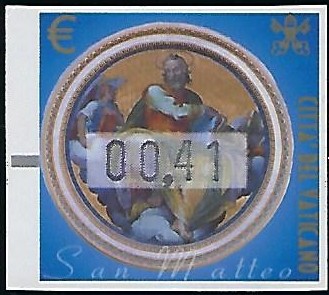
Home


  
Vatican City stamps featuring Saint Matthew: From the Evangelists Airmail Set, Scott C55 (1971) Beginning of the Gospel of Matthew, Scott 521 (1972) International Peace Year (Matthew 5:9), Scott 770 (1986) Evangelists Vending Machine Set, Scott V11 (2002) "Martyrdom of Saint Matthew" by Carravaggio, Scott 1776 (2021) The Feast of Saint Matthew is celebrated on September 21. Matthew was one of the twelve apostles of Jesus and, according to Christian tradition, one of the four Evangelists as the author of the Gospel of Matthew. Matthew was a publican (tax collector) who worked for the Roman administrators in Capernaum. He was called by Jesus to be a disciple in Matthew 9:9: "As Jesus passed on from there, [after healing the paralytic, in Mt. 9:1-8] he saw a man called Matthew sitting in a tax office and he said to him, ‘Follow me.’ And he rose and followed him."In Matthew 9:13, Jesus was then questioned by the Pharisees as to why he would sit with tax collectors and sinners. Jesus’ reply was: "For I came not to call the righteous but sinners."Matthew is believed to have evangelized in Syria and Ethiopia; both are suggested as the location where he was martyred. His relics were relocated to Sicily by Robert Giscard (d. 1085), a Norman adventurer who established control of southern Italy and Sicily. His shrine is at the Salerno Cathedral in southern Italy, which is dedicated to Saint Matthew and whose relics are found inside the crypt.  "Saint Matthew", by Camillo Rusconi (circa 1715) Basilica of Saint John Lateran, Rome Photo by Marie-Lan Nguyen From Wikimedia Commons, used under the terms of the Creative Commons Attribution 2.5 Generic license The Gospel of Matthew was written in the second half of the first century. It is often thought to have been drawn from the Gospel of St. Mark. Matthew is referred to as Levi by both Mark and Luke. Both St. Irenaeus (d. 202 AD), the Bishop of Lyons and Doctor of the Church (originally from Smyrna with ties to the Apostles or those who heard their preachings) and St. Jerome (d. 420), substantiate Matthew as the writer of the Gospel that bears his name. REFERENCES: |